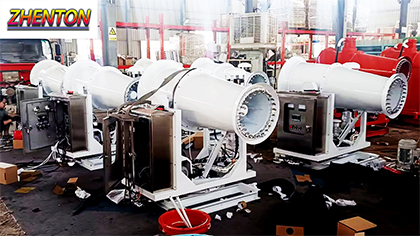To Minimize Airborne Particles During Demolition,
Spray Water Mixed With a Small Amount of
Detergent as Needed.Remove Construction Debris
Via Approved Routes,Ensuring It is Covered,Netted,
or OtherwiseContained to Prevent Dust Generation,
or Perform Removal During off Hours.
Two Common Types of Dust Suppression Systems on
Demolition Sites Include:
Mist:Misting Systems are Different From The"Wet Wet
Wet"Method That We Detailed Above in That They're
Designed to Create an Atomized Fog in Certain Areas
of The Job Site,Rather Than Soak The Entire Job Site.

Purpose of Misting Systems:The Main Goal is to Control
Dust By Creating a Fine Mist (Atomized Fog) Rather Than
Drenching The Entire Area,Which Likely Reduces Water
Usage and Potential Issues With Excess Water on The Site.
This Approach is Particularly Effective for Dust Suppression
in Construction and Dust Suppression in Coal Mines,
Where Managing Dust is Crucial for Both Health and
Operational Efficiency.
Dust Suppression Fans:These are Another Popular
Method for Controlling Dust on Demolition Sites.
Dust Suppression Fans Work By Distributing a Fine
Mist Over a Large Area,Which Helps to Settle Dust
Particles Quickly.This Method is Often Used in
Conjunction With Other Dust Suppression Measures
to Ensure a Comprehensive Approach to Dust Control.
How do You Clean Dust After Demolition?
Using a Damp,Clean Cloth With a Mild Water and
Cleaner Mixture is an Effective Cleaning Solution.
You Don't Need Anything Fancy;The Goal is to Remove
The Dust Without Spreading or Blowing it Around.a
Barely Damp Cloth,Thoroughly Rinsed Throughout Your
Wipe Downs,is Ideal.This Method Ensures That Dust is
Effectively Collected and Removed,Minimizing The Risk
of Inhalation or Recontamination.










